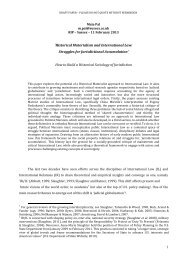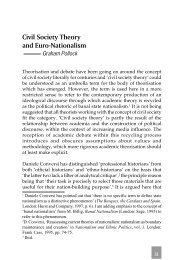Hannah Arendt's Concept of Responsibility - University of Sussex
Hannah Arendt's Concept of Responsibility - University of Sussex
Hannah Arendt's Concept of Responsibility - University of Sussex
You also want an ePaper? Increase the reach of your titles
YUMPU automatically turns print PDFs into web optimized ePapers that Google loves.
Herzog: <strong>Hannah</strong> Arendt<br />
responsibility: responsible acts are the actualisation <strong>of</strong> a belonging not only<br />
to a specific community, but to the world in general. Or, more precisely, it is<br />
through belonging to a community transformed by individual opinions that<br />
we are responsible for the world. In this sense, the 'banality <strong>of</strong> evil' is a lack<br />
<strong>of</strong> responsibility for the world.<br />
Accordingly, responsibility has a radical meaning, which includes the possible<br />
need to sacrifice oneself ‘for the world.’ Much has been said about <strong>Arendt's</strong><br />
‘love <strong>of</strong> the world.’ To my mind, however, Arendt’s responsibility to the world<br />
has to do with gratitude rather than with love. In her letter to Scholem,<br />
Arendt wrote that, ‘the only kind <strong>of</strong> love I know <strong>of</strong> and believe in is the love<br />
<strong>of</strong> persons.’ (1978a: 246) It is true that in a letter to Jaspers in 1955 she had<br />
written: ‘I’ve begun so late … to truly love the world … Out <strong>of</strong> gratitude, I<br />
want to call my book on political theories “Amor Mundi”.’ (Kohler and Saner,<br />
1992: 264) But the book was eventually called The Human Condition and<br />
Arendt mentioned gratitude again in the letter quoted above to Scholem,<br />
when she said ‘[t]here is such a thing as a basic gratitude for everything that<br />
is as it is; for what has been given and was not, could not be, made.’<br />
<strong>Responsibility</strong>, which we can now define as the critical and radical transformation<br />
<strong>of</strong> a given fellowship through representative opinions and actions, is<br />
an expression <strong>of</strong> ‘metaphysical’ gratitude for everything that has been given. 14<br />
Eichmann's metaphysical banal evil consists <strong>of</strong> nihilism, <strong>of</strong> destroying the<br />
given by erasing particular ‘nations,’ namely, <strong>of</strong> deciding what should not be:<br />
And just as you supported and carried out a policy <strong>of</strong> not wanting to<br />
share the earth with the Jewish people and the people <strong>of</strong> a number <strong>of</strong><br />
other nations - as though you and your superiors had any right to<br />
determine who should and who should not inhabit the world - we find<br />
that no one, that is, no member <strong>of</strong> the human race, can be expected<br />
to share the earth with you. This is the reason, and the only reason;<br />
you must hang. (1994b: 279)<br />
<strong>Responsibility</strong>, on the contrary, means continuing that what is, even if it<br />
requires non-compliance with laws and (paradoxically) sacrifice <strong>of</strong> one's life,<br />
as was illustrated in the case <strong>of</strong> Anton Schmidt. It is ‘ontologically rooted’ in<br />
‘the miracle that saves the world,’ namely, natality (1998: 247). It is then contingently<br />
constructed through critical oppositions and changes in localised<br />
communities. These changes take into account the given, the others who surround<br />
me and are sometimes spatially or temporally absent. Visiting opinions<br />
Studies in Social and Political Thought Page 51
















